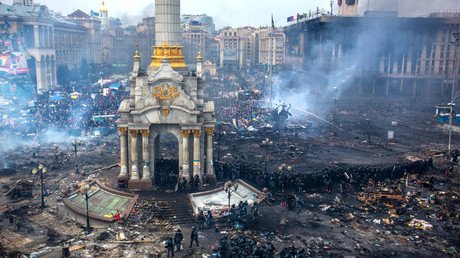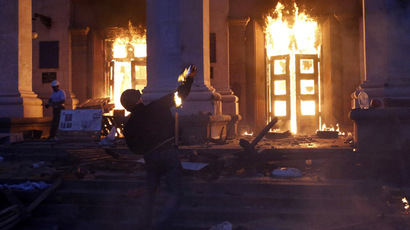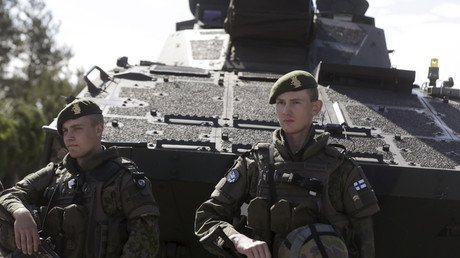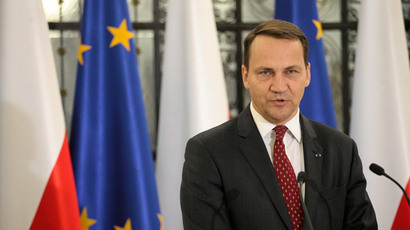‘Hybrid Warfare’: Anti-Russia propaganda finds a new buzzword
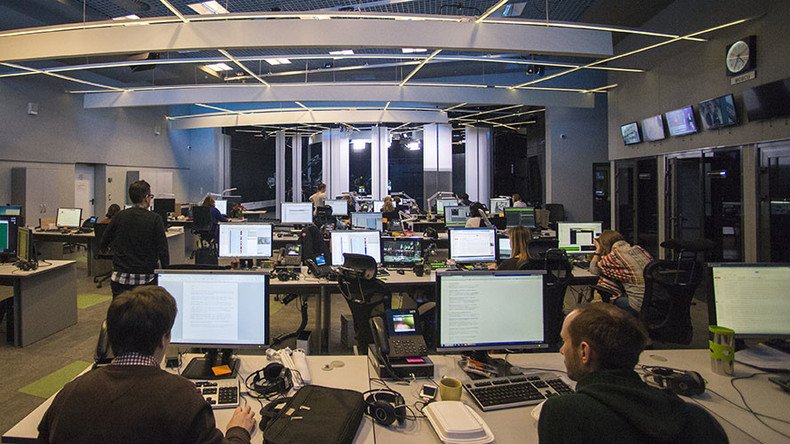
When western media makes up stories about Russia, it's no big deal. When Russian media get things wrong, it's "hybrid war."
Last week, British state-controlled TV created hysteria with a documentary about a putative Russian invasion of Latvia. As usual, while the Latvians were miffed, nobody west of Kaliningrad had any difficulty with it. They were more concerned with the segment that showed the UK being nuked.
Meanwhile, French television aired a new, independent, documentary about Ukraine's Maidan coup and was immediately chastised for promoting "Russian propaganda." This despite it being an entirely French-made production with no Russian input.
Thus, we again discover that the Western establishment believes it has a monopoly on truth. That only its narrative is worthy and anything that challenges the consensus is "disinformation."
If Evelyn Waugh were around today he wouldn't need to invent William Boot. Too many living, breathing, equivalents have passed through Ukraine and Turkey (the base for Syria coverage) in the past two years. By the same token, George Orwell's Winston Smith seems tame compared to agitprop practitioners of today. A certain cabal in the pro-NATO realm has decided that cynicism is somehow unique to Russia. Bewilderingly, their exclusive focus on Russia invalidates much of this enterprise. They are blind to it in their own back yards.
For those of us who follow media, the last week has been truly instructive. An independent French journalist, Paul Moreira, decided to challenge the pro-Maidan group-think in the popular press. As it happens, not one fact in his documentary was noticeably erroneous.
In fact, Moreira's report is relatively mild. It focuses on violent paramilitary groups which helped the current leaders to assume power in 2014. These outfits do exist and they are not figments of Russian imaginations. Moreira's crime is exposing this reality to French mainstream audiences for the first time.
Somewhat predictably, the current Kiev regime attempted to pressure Canal+, the French network which broadcast the film, to cancel the broadcast. The Foreign Ministry accused it of peddling "conspiracy theories" and "Russian propaganda."
The Silence of Hypocrisy
Interestingly, none of the leading Western outlets have covered the story. Not only are they are totally disinterested in the Canal+ film and its revelations, it seems that from The Guardian to The New York Times to The Washington Post to Der Spiegel none of them feel that Ukraine's attempt to pressure a leading French media company is newsworthy. Of course, if they reported this case, it would highlight their own one-sided coverage of the Ukraine crisis.
Now, please envisage if the shoe was on another foot. Imagine that a private Russian TV station tried to air a documentary challenging the Kremlin's position on Ukraine. Suppose, Sergey Lavrov's Foreign Ministry publicly attempted to have the broadcast prevented. Do you really believe the same Western media concerns would ignore that fable? If you answered ‘yes,' congratulations, you must work for NATO.
Anybody who observes the media, and the think-tank racket, knows that the predilection to portray Russian as ‘bad’ and all its enemies as ‘good,’ means that sort of parable would go viral within a few minutes. Such is the extreme anti-Russia slant right now, becoming an enemy of Moscow quickly makes you a secular saint in Washington and Brussels. Even North Korea's Kim Jong-un could probably redeem himself, if he managed to manufacture a conflict with Vladimir Putin. In fact, it's possible to visualize John McCain speaking of "brave Kim and the resolute North Korean people who stand against Russian ‘aggression.'"
The Canal+ documentary covers myriad topics that Western organizations have deliberately neglected. For example, the veracity of accepted wisdom about who really killed the ‘Heavenly One Hundred’ in 2014 at Maidan. The popular press isn't interested in authenticity. If they were, they'd highlight Ivan Katchanovski's rigorous investigation which fingers pro-coup militants. They ignore this, brilliant, document because it challenges their false narrative. By contrast, if the ‘citizen journalists' at Bellingcat, working with NATO's Atlantic Council appendage, produced something similar, with the opposite view, it'd be front-page news.
Moreira also examines what happened in Odessa in May 2014, when 46 anti-government protestors were burned alive by pro-regime militants.
No Revolution
Two years later, the Western information machine is unwilling to challenge the "revolution of dignity" (sic). Of course, calling it a "revolution" is absurd in itself. A "revolution" implies that everything changed. Like Russia in 1917 for instance. In Ukraine, the same people own the media, the same oligarchs control key industries, the parliament broadly contains the same faces and the military and police the same commanders. That is not a "revolution." It's a transfer of power within the existing system from one faction to another. It's wasn't exactly the "stunde null (zero hour)" of Berlin, 1945.
The BBC also ignored the Canal+/Ukraine stand-off. They were too busy airing a documentary about a fantasy Russian invasion of Latvia. The show was nicely timed as the British government is currently trying to force a £100 billion ($144 billion) upgrade of their Trident nuclear deterrent through parliament. The opposition leader, Jeremy Corbyn, contends that the money might be better spent elsewhere. This is hardly surprising, given that the UK is forecast to run a £69.5 billion budget deficit in the year to April 2016. In addition, over one million Brits currently rely on free food-banks to survive.
The BBC's present anti-Russia campaign (two weeks ago it alleged Vladimir Putin was worth $40 billion) is music to the ears of the UK authorities. Especially at a time when David Cameron's administration is considering significant ‘reform' to the broadcaster. Knowing that the BBC stands ready to promote the government's agenda must be a great comfort to the establishment. NATO will also be delighted, as it's currently proposing to quadruple its defense spending in Europe.
The Power of Words
Then we have "hybrid war." In the last week, as if on cue, Der Spiegel, Bild and The Atlantic Council have all, seamlessly, carried reports promoting this term to describe a few instances of inaccurate media coverage. Reuters then alleged that Russia was conducting "hybrid war" against Germany. The author was a writer attached to, German state-controlled, Deutsche Welle, who covers Russia and Ukraine from Berlin.
The complaint is about a report on Russia's Channel One on Jan 16. It alleged that a 13-year-old girl with dual Russian/German citizenship had been raped in Berlin by Middle Eastern migrants. The story was later proven to be false.
This is not "hybrid warfare." In reality, the girl did actually, at first, allege that she had been raped, before her version of events was disproven. Sure, some Russian media elements gave the subject more attention that it probably warranted. But that's hardly “hybrid warfare." Last May, neoconservative bullhorn The Daily Beast insisted that Russia was about to invade Ukraine in the summer of 2015. As we know, this never happened. Is this not “hybrid warfare” and deliberate disinformation? Or is it just bad journalism, by writers not qualified to comment on the matter?
Oddly, when the Western media carries bogus tales about Russia, this isn't labeled "hybrid warfare." Such as when Politico alleged that Putin had offered to divide Ukraine with his Polish counterpart. Or when Foreign Affairs insists Russia is about to collapse, something they've done practically annually since 1999. Indeed, last week a Polish TV host fabricated the death of her grandfather at the hands of a Russian general. Back in December, German state-run ZDF was accused of apparently indulging in some ‘artistic license,' paying a young Russian to say he was fighting in Ukraine.
None of these examples are ever cited as “hybrid warfare" or "propaganda" in Western discourse. Nor, incidentally, are they termed ‘bad journalism' either.
Like death and taxes, atrocious journalism is a lousy fact of life. We know that coverage of Russia seems to attract more of it than anything outside of the tabloid soccer beat. Especially today when Western Moscow reportage is usually provided by enthusiastic amateurs rather than professional, properly-trained, journalists.
The problem with the "hybrid war" premise is that its advocates are frequently guilty of the same thing themselves, through distortions which make Russia seem far more threatening than it really is.
The statements, views and opinions expressed in this column are solely those of the author and do not necessarily represent those of RT.

